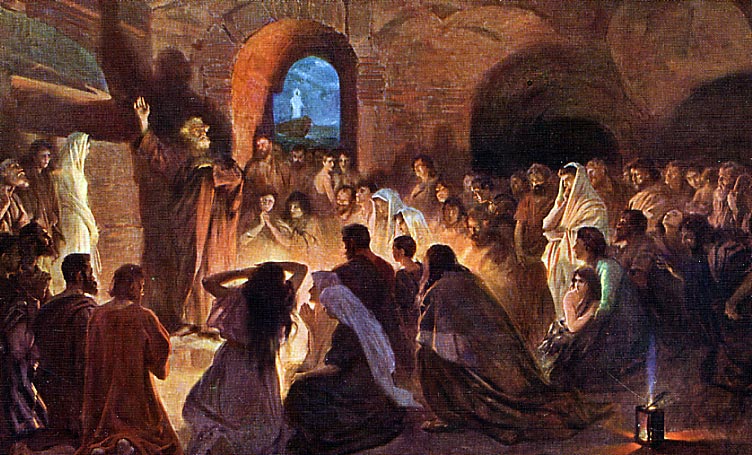Catholics who attended Mass at risk of their lives considered themselves free. They understood (and still understand, in places like China), that freedom comes from God. They therefore exercised their freedom in worship of Him, even if prudence required furtiveness.
 Persecuted Catholics gather in the catacombs
Persecuted Catholics gather in the catacombs
Are we free to attend Mass in the United States? The civil authorities in certain places have said no. Do we have the residual freedom to defy that ban and attend Mass on warrant from God? Unbelievably, the ecclesiastical authorities in certain places have also said no.
Being told no by both state and Church makes God effectively disappear. In reality, God granted us freedom, but the Church now backs up the state's denial of that freedom.
Do Church leaders expect people to return to Mass when the state eventually approves?
Compare this to the Anglo-Saxon Dooms, the law of pre-Norman England, which typically began with an assurance of the Church's liberty. This conception was deeply Catholic—that just as God comes before the world, so the Church comes before the state. The state therefore acknowledged the priority and pledged to protect it.
Traces of this tradition are found in the Declaration of Independence of 1776, the Treaty of Paris of 1783, and the Constitution of 1787. But about a thousand years of human progress has changed the law. While the United States did not set out to abolish the Church, neither did it acknowledge her. The new government viewed life on the horizontal plane.
Well, death is pretty weighty on the horizontal plane. One can't be surprised that leaders of such a government would fear death more than God.
Why, however, do certain Church leaders take a similar view? Why can't they grant priests who are willing to say public Masses, and the faithful who are willing to attend, the freedom to do so, even if prudence requires precautions?
I'd risk it.





